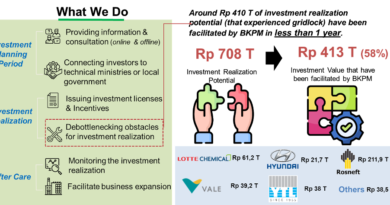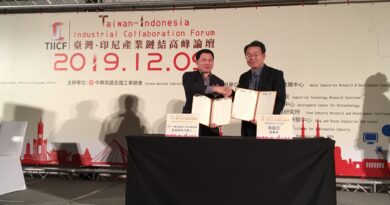Indonesia’s Omnibus Law Benefit for Investor
Indonesia’s Omnibus Law Benefit for Investor
「印尼創造就業綜合法」(Omnibus Law) 對外資的益處

© CNN INDONESIA 印尼總統佐科威(JOKO WIDODO)
Indonesia President’s Jokowidodo submitted a draft bill to the country’s parliament. The draft is widely known as the “omnibus law” and aims to transform Indonesia’s economy. President Widodo presented his vision of Indonesia in 2045 in last October. An economy’s article written by Floris Van Der Velde mentioned that “Our dream is that by 2045, Indonesia’s gross domestic product will have reached US$7 trillion. Indonesia will have become one of the top five world economies with a poverty rate nearing zero percent. That is what we must head toward.”
印尼總統佐科威(Joko Widodo) 向該國會提交了一項法案。該草案被廣泛稱為「印尼創造就業綜合法」(Omnibus Law),旨將改進印尼的經濟。去年10月,佐科威總統提出他對印尼2045年的展望。弗洛里斯·範·德·維爾德(Floris Van Der Velde)撰寫的經濟文章提到:「我們在2045年的夢想,印尼的國內生產總值將達到7萬億美元。印尼將成為貧困率接近零的世界五大經濟體系之一。這就是我們必須走向的方向。
The government realizes that to fulfill this vision, it must address the problem of over-regulation in Indonesia. Indonesia is currently ranked 73rd among 190 economies in the World Bank’s Ease of Doing Business list. The omnibus law is designed to help meet these lofty goals, in part by streamlining the country’s complex, sometimes redundant regulatory environment. The law would ease restrictions in 11 critical areas, including labor law, capital investment, business licensing, corporate tax and land acquisition. Needless to say, these measures if adopted would make Indonesia a far more attractive destination for foreign businesses and investors.
政府意識到,要實現這一願景,就必須解決印尼的過度規管問題。依據世界銀行公布全球經商容易度調查,印尼在全球190國中排名73名。「印尼創造就業綜合法」(Omnibus Law) 是為達成這些高崇的目標,簡化國家的複雜度與多餘的監管環境。該法律將放寬對11個關鍵領域的限制,包括勞動法、資本投資、營業執照、公司稅和土地收購。如果採取這些措施,將使印尼成為外國企業和投資者更具有吸引力的投資目的地。
Easiest to apply business licensing
最容易申請企業許可
Any business in Indonesia now requires one or more licenses to operate, and many of these must be extended after a certain period. The responsibility for issuing business licenses is spread across many government institutions and regional governments. This multi-layered system, involving various state, local and central agencies, makes it very difficult for an investor to know what business permits and licenses must be obtained, where to obtain them, and in what order they should be applied for. The role of the national Investment Coordinating Board (BKPM) will be strengthened and is set to play a pivotal role in streamlining the issuing of all business licenses. Under the proposed law, a foreign investor will be able to obtain a business license through an online single submission (OSS) system, eliminating the need to go through multiple ministries or other government institutions.
The omnibus law will also introduce a risk-based-approach system, dividing businesses into categories of low, middle and high risk. Businesses deemed low risk will no longer be required to obtain a business license, only a registration number. Middle-risk businesses will also not be required to obtain a business license, but will need a standard certification. High-risk businesses will still be required to obtain a full business license.
在印尼任何企業現在都需要一或多項許可證才能運營,其中幾項許可證必須定期延期。頒發營業執照的責任分散在許多政府機構以及地區政府。這種由各個州、地方和中央機構參與的多層系統,使投資者很難知道必須獲得哪些商業許可和許可證,去哪裡獲得以及申請順序。「印尼投資協調委員會」(BKPM)的角色會更為加強,並將所有營業執照的作業以及手續簡化。根據擬議的法律,外國投資者將可以通過線上申請(OSS)系統獲得營業執照,而無需經過多個單位或政府機構申請。「印尼創造就業綜合法」(Omnibus Law)也將引入「風險基礎方法」體系,將商業分別為低,中和高風險類別。被視為低風險的企業將不再需要獲得營業執照,而僅需要申請註冊號。中級風險企業也無需獲得營業執照,但需要標準認證。高風險企業仍將需要獲得完整的營業執照。
Reducing foreign investment restrictions
放寬外國投資限制
Indonesia now uses the negative investment list, which includes a number of business lines that are only partially open to foreign investment. To take two examples, companies engaged in large horticulture business are open to foreign ownership of up to 30 percent, and companies engaged in broadcasting business are open to foreign ownership of up to 20 percent.
Under the omnibus law we expect these and other business lines will be fully open to foreign ownership. If this is indeed the case, the new law will mark a dramatic liberalization of Indonesia’s foreign direct investment (FDI) regime. This element of the omnibus law must be clarified by a presidential regulation that includes a list of closed business lines.
印尼現在使用「投資負面表列清單」,其中包括一些只開放給外資投資部分投資的公司。舉兩個例子,從事大型園藝業務的公司對外資持股比例最高為30%,從事廣播業務的公司對外資持股比例最高為20%。根據「印尼創造就業綜合法」(Omnibus Law),我們預計這些和其他產業線將完全開放給外資所有。若此事為實,該新法律將對印尼的「對外直接投資」(FDI)制度呈現巨大的自由化。此印尼創造就業綜合法」(Omnibus Law)項目必須通過總統法規來闡明,其中包括一系列的「關閉產業」。
Easing labor laws
放寬勞基法
Indonesia has relatively strict labor laws. For example, the laws provide for generous mandatory severance compensation, by far the most generous in the APAC region. These and other worker-friendly laws deter many foreign investors. The omnibus law aims to make labor laws more flexible and market-friendly, and bring them more in line with other countries in the region.
It must be said that this is a sensitive subject in Indonesia that has generated considerable opposition from labor unions and other parties. While this should not be dismissed, some resistance is to be expected when a government seeks to relax worker protections.
印尼有相當嚴格的勞基法。例如,法律規定相當高的資遣費,此資遣費為亞太地區最高的。這些法律和其他對勞工友善的法律嚇阻了許多外國投資者。「印尼創造就業綜合法」(Omnibus Law)旨在使勞基法更加彈性以及市場友善,並與其他國家更加一致。必須說,這是印尼的一個敏感話題,引起了工會和其他政黨的強烈反對。雖然這不應該被駁回,但是當政府試圖放鬆對勞工的保護時,一定會面臨的一些阻力。
Streamlining corporate tax regulations
簡化公司稅務法規
A large part of the proposed omnibus law covers corporate taxation. Currently, there are many different tax laws in the country. Essentially, the bill provides for a unification of Indonesia’s scattered tax regulatory framework. It aims to minimize overlapping regulations and provide many corporate tax incentives, including adjustments to the following rates.
擬議的「印尼創造就業綜合法」(Omnibus Law)最大的一部就是分涉及到公司的納稅。目前,該國有許多不同的納稅法。本質上,該法案的規定將印尼分散的納稅監管框架統一化。這意味著,大程度地減少重疊法規,並提供許多公司納稅優惠,包括對稅率的調整。
Corporate income tax rate
企業所得稅稅率
The bill will gradually decrease the corporate income tax rate from 25 to 20 percent for the period 2021 to 2023. Furthermore, qualified public companies that trade at least 40 percent of their shares on the Indonesian stock exchange can apply for an additional 3 percent rate reduction. This decrease will make Indonesia more competitive with neighboring countries.
該法案將在2021至2023年期間將企業所得稅稅率從25%逐步降低至20%。此外,在印尼證券交易所交易至少40%股份的合格上市公司可以申請進一步降低3%的利率。這種減少將使印度尼西亞與鄰國更具競爭力。
Dividend tax rate
股息稅率
The bill will provide for income-tax-free dividend payments, as long as the full amount is re-invested in Indonesia.
該法案將規定免除所得稅的股息支付,只要將全部金額重新投資到印度尼西亞即可。
Interest tax rate
利息稅率
Indonesia’s current interest tax rate of 20 percent is high relative to other APAC countries. The proposed omnibus law will provide for a reduction of the rate of income tax coming from interest payments. The exact reduction has not yet been determined.
The deliberation of the omnibus bill is currently on hold due to the pandemic and is expected to be picked up in a few months. Despite this unavoidable delay, the proposed omnibus law clearly shows the Indonesian government is committed to minimizing red tape in virtually every area of business to woo foreign investors. Those investors should keep in mind that the omnibus bill will be deliberated in parliament and that there could be changes to the draft before it becomes law.
印尼目前的利率為20%,相對於其他亞太地區國家而言較高。擬議的「印尼創造就業綜合法」(Omnibus Law)規定將降低所得稅率的利息支付。確切的減少量尚未確定。目前,針對「印尼創造就業綜合法」(Omnibus Law)法案的審議,因為疫情的關係暫停,預計將在幾個月後繼續進行。儘管存在不可避免的延後,但擬議的「印尼創造就業綜合法」(Omnibus Law)清楚地表明,印尼政府致力於在幾乎每個領域中盡量減少繁文縟節,為吸引更多外國投資者。這些投資者應記住,「印尼創造就業綜合法」(Omnibus Law)法案將在國會中審議,並且該草案也將會依照審議結果而產生變化,後續才將成為法律。
Pros and Cons Omnibus Law
「印尼創造就業綜合法」(Omnibus Law)的優缺點

The omnibus law of the Job Creation law officially ratified by the government on October 5th, 2020. The omnibus law has received plenty of criticism, especially from workers regarding the law that are considered to be detrimental to labor’s rights and have an impact on job, income and social security. They are demanding the government to change the law that have more beneficial impact on workers rather than investor and to increase the minimum wage of workers by doing demonstration in front of government’s house of representative building (DPR building) in Jakarta. The demonstration also occurred in several district in Jakarta, including Bekasi, Banten, and other industrial district. Initially the masses of workers were going to Jakarta to join the demonstration, however they were stopped and directed to the other place around the district by police officers. Demonstration in industrial district were held in orderly manner without any violence under surveillance of police officers in every district. Regardless all the demonstration that happened recently, the omnibus law was still signed by President Jokowidodo on November 2nd, 2020. However, on the other hand in the response of the demonstration the President of the Confederation of Indonesian Workers Unions (KSPI) Said Iqbal and the President of the Confederation of All Indonesian Workers Unions (KSPSI) Andi Gani Nena Wea went to the Constitutional Court Building to file a judicial review of the omnibus law.
2020年10月5日,政府正式批准了《創造就業法》的「印尼創造就業綜合法」(Omnibus Law)。「印尼創造就業綜合法」(Omnibus Law)受到了很多批評,特別是來自勞工的批評,認為該法律有害於勞工權利並影響工作、收入以及社會保障。他們要求政府修改勞基法,希望政府修訂的法律有利於勞工,而不只是投資者,並通過在雅加達國會大樓(DPR大樓)前進行抗議要求提高基本工資制度。抗議活動也發生在雅加達的幾個地區,包括勿加泗、萬丹和其他工業區。最初,大量的勞工要去雅加達參加抗議活動,但是他們被警察攔下並帶到該地區的其他地方。工業區的抗議活動有條不紊,在每個區的警官的監視下沒有發生任何暴力行為。儘管最近發生的所有抗議活動,「印尼創造就業綜合法」(Omnibus Law)法案仍由印尼總統佐科威於2020年11月2日簽署。但是,另一方面,在抗議活動中,印尼勞工聯合會(KSPI)主席伊克巴爾(Said Iqbal)和所有印尼勞工聯合會(KSPSI)主席安迪·加尼·納娜·維阿(Andi Gani Nena Wea)前往憲法法院大樓對,「印尼創造就業綜合法」(Omnibus Law)申請司法審查。



